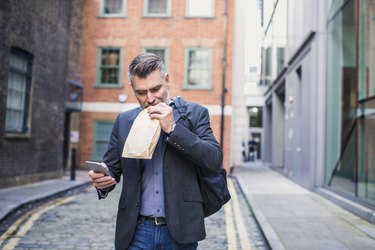
The old parental advice "no swimming for 30 minutes after eating" sticks in our heads, but are there other activities we should steer clear from as well? As it turns out the answer is yes, and for a variety of reasons — some of which will likely surprise you.
Here are three things you should avoid doing right after a meal and two to do instead.
Video of the Day
Video of the Day
1. Brush Your Teeth
This might sound counterintuitive — and in some cases it is — but hear us out. Eating foods high in carbohydrates and sugars like soda, bread, cookies, etc. causes certain bacteria to form in your mouth, according to the Mayo Clinic. This type of bacteria attacks the tooth enamel, so brushing right after eating these types of foods can help to prevent this bacteria from building up.
But you want to avoid brushing your teeth right after eating when you've been noshing on anything acidic like wine or citrus fruit. In that case, there's a 30-minute window post-eating when you should avoid brushing your teeth because it can actually damage the enamel in its already-weakened state (and, sadly, our enamel doesn't grow back). Instead, brush your teeth before acidic foods and drink a glass of water afterwards to help wash away the acids from your mouth.
2. Hit the Hay
There's an ongoing debate about whether a late-night snack can help or hurt your waistline, but one thing is for certain: Sleeping right after eating is not doing you any favors when it comes to avoiding heartburn and getting quality zzzs.
According to GI experts at the Mayo Clinic, you should wait at least three hours after eating (snacks included) before lying down. Why? Digestion should take place while you're vertical, not horizontal.
When we eat, food sits in our stomach like a short-term storage unit. And if we're lying down, we no longer have gravity working in our favor to help said food and stomach acid continue working its way down. Instead, it's easier for the food and acid to flow back into your esophagus, and that's when you get heartburn.
Some foods are bigger culprits than others: High-fat foods, alcohol and fried foods are more likely to end in heartburn. Large meals that are high in fat, as well as alcohol, can also make it more difficult to fall asleep and to get a sound night's sleep, per the Mayo Clinic.
Related Reading
3. Exercise (Yes, This Includes Swimming)
Mother's advice to stay out of the pool after eating appears to be sound, but not for the reasons we initially thought. The old thinking was that the digestion process requires blood and diverts the red stuff away from your extremities, which could leave you feeling fatigued and at risk for drowning. While yes, digestion does require blood to function properly, there's enough to go around — your body can digest a meal and maintain function in your extremities at the same time, according to the Mayo Clinic.
Exercising or being overly active after a meal is not a good idea, though, if you want to avoid an upset stomach or muscle cramping. If you eat a large meal, wait three to four hours before exercising. If you have a snack or small meal, wait one to two hours.
2 Things to Do After Eating to Help With Digestion
1. Take a Leisurely Stroll
Yes, exercise is out, but a slow walk — think: 2.5 mile-per-hour pace — may be just what you need to help things digest after a meal, according to Piedmont Healthcare. It can help regulate your blood sugar levels, too, so walking is especially helpful after a large meal. A study published in the Journal of Gastroenterology and Liver Diseases in March 2008 found a leisurely stroll beat out other common post-meal traditions like sipping an espresso or a digestif. Walking accelerated digestion by 14 percent without any reports of reflux or heartburn.
2. Drink a Glass of Water
Water is also great for digestion because it helps to keep things moving throughout the GI tract, especially when you're eating high-fiber foods. The National Health Service recommends drinking water with every meal. This way, you're closer to reaching your target water intake for the day and ensuring healthy digestion.
- Mayo Clinic: "Should you wait 30 minutes to swim after eating?"
- Mayo Clinic: "Timing Snacks to Avoid Heartburn"
- Mayo Clinic: "Foods and Sleep"
- Journal of Gastroenterology and Liver Diseases: "Postprandial Walking but not Consumption of Alcoholic Digestifs or Espresso Accelerates Gastric Emptying in Healthy Volunteers"
- National Health Service: "Good Foods to Help Your Digestion"
- Mayo Clinic: "When and how often should you brush your teeth?"
- Piedmont Healthcare: "5 things to do after eating a large meal"
Is this an emergency? If you are experiencing serious medical symptoms, please see the National Library of Medicine’s list of signs you need emergency medical attention or call 911.